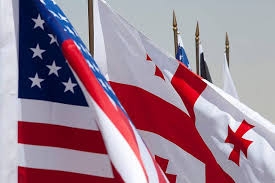Like Father Like Son
OP-ED
Let us imagine that the Father is the 400 year old American democracy – well weathered, unfailing and almost infallible, and the Son happens to be its newly born, inexperienced and still fragile Georgian replica. Father and Son have long been separated by the cruel vicissitudes of life, and finally have embraced each other in mutual understanding, love and collaboration. In separation, they were influenced by radically differing ideological powers, but when united, they voluntarily shared their life philosophies and strategic partnership under the oath of faithful dedication to the same principle of political coexistence. The Father has patiently been watching the Son for several decades, whose social, economic and political antics and frolics were tolerantly taken for granted, with both hands full of extravagant contributions, offered graciously and unequivocally.
And behold the fruits of this lovely and highly appreciable cooperation: as if out of the blue, the uncanny resemblance has materialized between these two democracies: the current Georgian opposition’s style and fuel used against the current ruling power reminds us with almost impossible precision of the fight of the Democrats, soaked to the skin with belligerent liberalism, against their most favorite target, the current conservative Republican President of the United States of America, who they take as the authoritarian, chaotic, and incompetent leader of the nation.
Those two oppositional political bodies, one Georgian and the other American, seemingly so different and working on opposite sides of the seas, operate in exactly the same way when it comes to the abusive language used against their respective political adversaries. It makes no sense to go into the details of their everyday routines, but the resemblance is truly unbelievable, especially in the period of pre-electoral fever. Embedded in the bipartisan system of polity, the American Republicans and Democrats have never before seen the level of strain and pain of their political fight comparable to the one they are exercising against each other today. And the same is happening in Georgia: this political culture has gone through a lot of ideological controversy in the last 30 years or so, but nothing like what is happening right now.
Liberal democrats in America would go to any length to make up myriad unimaginable deprecating stories against current American leadership; the attitude and the propagandistic methodology of the current Georgian opposition repeat their overseas colleagues and fellow-thinkers with amazing likeness and diligence. The American Democratic Party is craving political revenge like never before, bending over backwards to achieve the goal; the united Georgian opposition would just as well do anything to hit the same target. The American democrats would disapprove of any useful-for-the-nation idea or project if they came from the depths of the Republican political philosophy; the Georgian opposition likewise. The American Democrats ascribe every vice of the society and each failure of the country to the current White House; the Georgian opposition is ready to put the entire responsibility for the current strife and friction on the shoulders of this administration.
To put all these judgments in a nutshell, one more similarity between the Father and the Son might emerge for further discussion. And that is the possibility of moving to a bipartisan political system in Georgia. Why not? I can throw in a lot of arguments to support this wild idea. In fact, we already have a bipartisan system: the ruling power on one side and the united opposition on the other. America, too, has come to a bipartisan model of governance via numerous pros and cons, tons of difficulties and hot controversies. A real bipartisan system might work as the final decisive step on the way to a strong mature democracy, devoid of habitual multi-lateral political bla-bla and filled with enough constructiveness on Georgia’s political road, conducive to the long-awaited political solidity and economic stability, balanced with healthy social activity. I would go ahead and try this daring presumption for real. What’s wrong with trying? Especially when you have nothing better to hand!
Op-Ed by Nugzar B. Ruhadze












